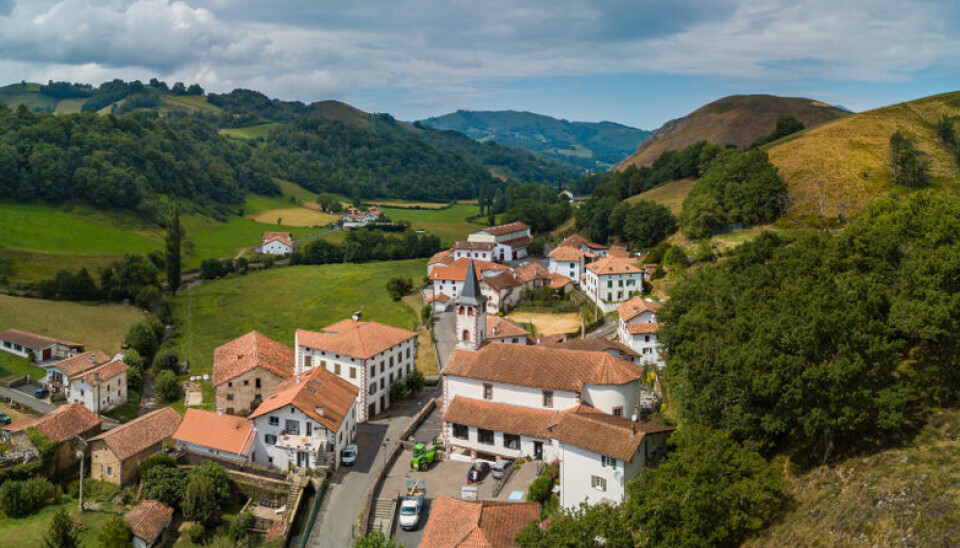-
Rugby vocabulary to know if watching the Six Nations in France
From un tampon to une cathédrale, understand the meaning of key French rugby terms
-
Discover La Routo, the historic 500km hiking trail from France to Italy
The hiking path from the Camargue to the Italian Alps, rich in history, culture, and stunning landscapes, is perfect for serious hikers and history enthusiasts
-
Best French communes to live in named in 2026 ranking
Criteria include beauty, heritage, health, nature and accessibility by public transport
Remote French village reinvigorated by women farmers and Basque pigs
A new generation of dynamic young farmers is moving into Urepel, but the telephone reception is not quite as vigorous

The village of Urepel in the Pyrénées-Atlantiques region, with around 295 inhabitants, can make you feel as if you have gone back in time to the early twentieth century.
Only the sinuous D958 will take you to the 996m-high village, where local shepherd and former presidential candidate Jean Lassalle is a national hero, having received 41.8% of the votes, or forty times the national average of 1.21%.
If you pass Urepel and its steep meadows to take the D158, you may very well find yourself already in Spain: the first petrol station, 4.4 kilometres down the road, serves as the unofficial border.
Urepel is remote
Wherever you look, the closest town is nowhere to be found.
Bayonne (Pyrénées-Atlantiques) is 69 kilometres north-west, while Pau (Pyrénées-Atlantiques) is a whole 147 kilometres away to the north-east.
Typical etche (farmhouses) show the village was a former bastion of miners and farmers.
Read more: Basque houses have timeless appeal – we look at their history
From 4,000 inhabitants shared among the three villages of the Aldudes Valley in the nineteenth century, the closing of mines, urbanisation, and immigration to the United States all accelerated the exodus to reduce the rural population by the late twentieth century.
Telephone connectivity is challenging
While Urepel is technically not in a zone blanche (an area where communication networks are non-existent), reaching someone over the phone remains as challenging as physically getting there.
Phoning the mairie during office hours produces an unidentifiable sound, which continues until the call is transferred to a mailbox.
The caller is then left with the feeling that the ringing must surely fill the emptiness of the building.
Reaching the mayor, Xole Aire (pronounced cholé in Basque) via her personal phone does not help either, leaving the caller with the inadvertent feeling that she must have left it at the farm while working the cattle in a nearby field.
Read more: Make sense of France’s rollout of new 5G mobile phone technology
Urepel breeds farmers
It is one of the most common professions in the Basque country.
The village is most famous for its brebis cheese, one of the very last to be made with unpasteurized ewe’s milk.
This summer has had devastating consequences for agriculture here, with most farmers coping with dry soil, lack of water and soaring prices.
Some farmers have already concluded that 2022 was a drier season even than 2003, and with more extreme levels of heat.
Attracting younger residents
However pristine and peaceful it might be, Urepel has managed to stop its population decline by attracting younger newcomers.
This is particularly due to the village having a higher than ever percentage of women farmers.
Ms Aire is among them, having taken responsibility for the family farm after spending ten years as a teacher.
More than 8,000 animals were logged for the village in 2020, up from an all-time low of 25 several decades ago.
Others have invested in former declining industries
Pierre Oteiza, for example, established a farm with Kintoa pigs, a characteristic black-and-white Basque breed.
Mattin Suquilbide, the mayor of nearby Aldudes village, also wants to keep young people in the region and has plans to include Urepel in a scheme that looks to reinvigorate the local postal office in Aldudes which serves Urepel.
There was a time when they considered suspending the service altogether. But it has withstood the test of time as it is still open for two hours per day.
But if you attempt to call them, prepare yourself for a ringtone that never ends...
Related articles
French court orders 4G antenna switch-off over cow health concerns
98-year-old mountain train to get new track in south west France
Five French towns for day trips into Spain, Switzerland and Germany
























